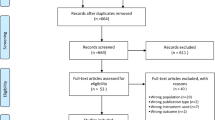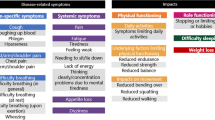Abstract
Purpose
Obtaining qualitative data directly from the patient perspective enhances the content validity of patient-reported outcome (PRO) instruments. The objective of this qualitative study was to evaluate the content validity of the Lung Cancer Symptom Scale for Mesothelioma (LCSS-Meso) and its usability on an electronic device.
Methods
A cross-sectional methodological study, using a qualitative approach, was conducted among patients recruited from four clinical sites. The primary target population included patients with pleural mesothelioma; data were also collected from patients with peritoneal mesothelioma on an exploratory basis. Semi-structured interviews were conducted consisting of concept elicitation, cognitive interviewing, and evaluation of electronic patient-reported outcome (ePRO) usability.
Results
Participants (n = 21) were interviewed in person (n = 9) or by telephone (n = 12); 71% were male with a mean age of 69 years (SD = 14). The most common signs and symptoms experienced by participants with pleural mesothelioma (n = 18) were shortness of breath, fluid build-up, pain, fatigue, coughing, and appetite loss. The most commonly described symptoms for those with peritoneal mesothelioma (n = 4) were bloating, changes in appetite, fatigue, fluid build-up, shortness of breath, and pain. Participants with pleural mesothelioma commonly described symptoms assessed by the LCSS-Meso in language consistent with the questionnaire and a majority understood and easily completed each of the items. The ePRO version was easy to use, and there was no evidence that the electronic formatting changed the way participants responded to the questions.
Conclusions
Results support the content validity of the LCSS-Meso and the usability of the electronic format for use in assessing symptoms among patients with pleural mesothelioma.
Similar content being viewed by others
References
Remon J, Reguart N, Corral J, Lianes P (2015) Malignant pleural mesothelioma: new hope in the horizon with novel therapeutic strategies. Cancer Treat Rev 41(1):27–34. https://doi.org/10.1016/j.ctrv.2014.10.007
Stayner L, Welch LS, Lemen R (2013) The worldwide pandemic of asbestos-related diseases. Annu Rev Public Health 34(1):205–216. https://doi.org/10.1146/annurev-publhealth-031811-124704
Moore S, Darlison L, Tod AM (2010) Living with mesothelioma. A literature review. Eur J Cancer Care 19(4):458–468. https://doi.org/10.1111/j.1365-2354.2009.01162.x
Clayson H, Seymour J, Noble B (2005) Mesothelioma from the patient’s perspective. Hematol Oncol Clin North Am 19(6):1175–1190, viii. https://doi.org/10.1016/j.hoc.2005.09.003
Rothman M, Burke L, Erickson P, Leidy NK, Patrick DL, Petrie CD (2009) Use of existing patient-reported outcome (pro) instruments and their modification: the ispor good research practices for evaluating and documenting content validity for the use of existing instruments and their modification pro task force report. Value Health 12(8):1075–1083. https://doi.org/10.1111/j.1524-4733.2009.00603.x
Food and Drug Administration (2009) Guidance for industry on patient-reported outcome measures: use in medical product development to support labeling claims. Fed Regist 74(235):65132–65133
Casañas i Comabella C, Gibbons E, Fitzpatrick R (2010) A structured review of patient-reported outcome measures (proms) for lung cancer. Report to the Department of Health
Hollen PJ, Gralla RJ, Liepa AM, Symanowski JT, Rusthoven JJ (2006) Measuring quality of life in patients with pleural mesothelioma using a modified version of the Lung Cancer Symptom Scale (LCSS): psychometric properties of the LCSS-Meso. Support Care Cancer: Off J Multinatl Assoc Support Care Cancer 14(1):11–21. https://doi.org/10.1007/s00520-005-0837-0
Symanowski JT, Gralla RJ, Hollen PJ (2014) Enhancing accurate prediction of survival outcomes and aiding decision making in malignant pleural mesothelioma (MPM) using a 3-item index from the LCSS-meso pro measure: results from a randomized 444 patient prospective trial. J Clin Oncol (Abstract)
Hollen PJ, Gralla RJ, Liepa AM, Symanowski JT, Rusthoven JJ (2004) Adapting the lung cancer symptom scale (LCSS) to mesothelioma: using the LCSS-meso conceptual model for validation. Cancer 101(3):587–595. https://doi.org/10.1002/cncr.20315
Hollen PJ, Gralla RJ, Stewart JA, Meharchand JM, Wierzbicki R, Leighl N (2013) Can a computerized format replace a paper form in PRO and HRQL evaluation? Psychometric testing of the computer-assisted LCSS instrument (eLCSS-QL). Support Care Cancer: Off J Multinatl Assoc Support Care Cancer 21(1):165–172. https://doi.org/10.1007/s00520-012-1507-7
Muhr T (2004) User’s manual for atlas.Ti 5.0. Scientific Software Development, Berlin
Patrick DL, Burke LB, Gwaltney CJ, Leidy NK, Martin ML, Molsen E, Ring L (2011) Content validity-establishing and reporting the evidence in newly developed patient-reported outcomes (pro) instruments for medical product evaluation: Ispor Progood Research Practices Task Force report: part 1—eliciting concepts for a new pro instrument. Value Health 14(8):967–977. https://doi.org/10.1016/j.jval.2011.06.014
Leidy NK, Vernon M (2008) Perspectives on patient-reported outcomes: content validity and qualitative research in a changing clinical trial environment. PharmacoEconomics 26(5):363–370. https://doi.org/10.2165/00019053-200826050-00002
Dean RA, McClement SE (2002) Palliative care research: methodological and ethical challenges. Int J Palliat Nurs 8(8):376–380. https://doi.org/10.12968/ijpn.2002.8.8.10681
Acknowledgements
The authors thank Katelyn Cutts for her assistance during the study and Fritz Hamme, Janet Pooley, and Amara Tiebout for editorial and production assistance. Lastly, the authors thank the staff at the clinical sites and the patients who participated in this study.
Funding
Funding for this research and manuscript was provided by AstraZeneca.
Author information
Authors and Affiliations
Corresponding author
Ethics declarations
Conflict of interest
Dr. Halling is currently employeed and Ms. Cimms formerly employed by AstraZeneca. Dr. Gelhorn and Ms. Skalicky are current salaried employees, and Ms. Eremenco and Dr. Sexton are former employees of Evidera, a consulting company that has received funding from AZ for conducting the study. Dr. Mahoney’s institution received payment for participating in the research study. The authors have no other relevant affiliations or financial involvement with any organization or entity with financial interest in or financial conflict with the subject matter or materials discussed in the manuscript apart from those disclosed.
Ethical approval
All procedures performed in studies involving human participants were in accordance with the ethical standards of the institutional and/or national research committee and with the 1964 Helsinki declaration and its later amendments or comparable ethical standards.
Rights and permissions
About this article
Cite this article
Gelhorn, H.L., Skalicky, A.M., Balantac, Z. et al. Content validity and electronic PRO (ePRO) usability of the Lung Cancer Symptom Scale-Mesothelioma (LCSS-Meso) in mesothelioma patients. Support Care Cancer 26, 2229–2238 (2018). https://doi.org/10.1007/s00520-018-4061-0
Received:
Accepted:
Published:
Issue Date:
DOI: https://doi.org/10.1007/s00520-018-4061-0




